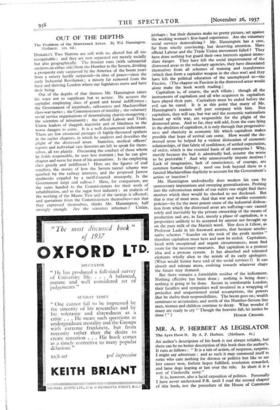OUT OF THE DEPTHS
The Problem of the Distressed Areas. By Wail Hannington. (Gollancz. Jos. 6d.)
DISRAELI'S Two Nations are still with us, ahered but all too recognisable ; and they are now separated not merely socially but also geographically. The frontier runs (with substantial enclaves on either side) from the Humber to the Severn, dividing a prosperity only surpassed by the America of the boom years from a misery hardly surpassed—in time of peace—since the early Industrial Revolution; a misery far removed from the busy and thriving London where our legislators move and have their being.
Out of the depths of that distress Mr. Hannington raises his voice not to supplicate but to accuse. He accuses the capitalist employing class of greed and brutal indifference ; the Government of ineptitude, callousness and Machiavellian class-war tactics ; the Commissioners of timidity ; the voluntary social service organisations of demoralising charity-mongering ; the scientists of inhumanity ; the official Labout and Trade Union leaders of sluggish inactivity and of blindness to the worse dangers to come. It is a well documented indictment. There are few emotional passages Or highly-flavoured epithets in the earlier chapters, in which he analysts and describes the plight of the distressed areas. Statistics, medical officers' reports and individual case histories are left to speak for them- selves, all too plainly. Discussing the conduct of those whom he holds responsible, he uses less restraint ; but he can give chapter and verse for most of his accusations. Is the employing class greedy and indifferent ? Here are the figures of coal royalties, the stories of how the Severn tunnel scheme was quashed by the railway interests, and the proposed Jarrow steelworks crippled by a tariff-fostered monopoly. Is the Government inept and callous ? Here, for comparison, are the sums handed to the Commissioners for their work of rehabilitation, and to the sugar beet industry ; an analysis of the working of the Means Test and of the savings it effected; and quotations from the Commissioners themselves—not that they expressed themselves, thinks Mr. Hannington, half strongly enough. Are the scientists inhuman ? Unfair, perhaps ; but their dietaries make no pretty picture, set against the working woman's first-hand experience. Are the voluntary social services demoralising ?- Mr. Hannington has a case, far from wholly convincing, but deserving attention. Have official Labour and the Trade Union movement failed ? They have done nothing but guard their own interests against imme- diate danger. They have left the social improvement of the distressed areas to the voluntary agencies, they have dissociated themselves from all schemes of training and transference (which thus form a capitalist weapon in the class war) and they have left the political education of the unemployed to—the Fascists. (The chapter on Fascism in the distressed areas would alone make the book worth reading.) Capitalism is, of course, the arch villain ; though all the instruments of capitalism and all who acquiesce in capitalism have played their part. Capitalism must be ended before the evil can be cured. It is at this point that many of Mr. Hannington% readers will part company with him. Not capitalism, they will say, but war and the economic nationalism bound up with war, are responsible for the plight of the distressed areas. And so far, they will add, from the cure lying in the abolition of capitalism, it is only through that progressive- ness and elasticity in economic life which capitalism makes possible that hope of revival can come. How would the dis- tressed areas be helped by a -violent dislocation of economic relationships, of that fabric of confidence, of settled expectation, of order, which is the essential basis of all enterprise ? Why, merely because the bad is admittedly bad, assume the worse to be preferable ? And why unnecessarily impute motives ? Lack of imagination, lack of omniscience, of courage, are common human failings ; need one look beyond these to a fancied Machiavellian duplicity to account for the Government's action or inaction ?
Mr. Hannington undoubtedly does weaken his case by unnecessary imputations and sweeping generalisations. Probing into the subconscious minds of our rulers one might find there motives which they would be shocked to see disclosed. But that is true of most men. And that war and warlike economic policies—by far the most potent cause of the industrial disloca- tion from which the distressed areas are suffering—are caused solely and inevitably by the private ownership of the means of production and are, in fact, merely a phase of capitalism, is a proposition unlikely to be accepted by anyone not brought up on the pure milk of the Marxist word. Nor does it follow, as Professor Laski in his foreword asserts, that because amelio- rative schemes " founder on the rock of the profit motive " therefore capitalism must here and now be ended. Capitalism, faced with exceptional and urgent circumstances, must find room for the necessary measures. But capitalism is a protean idea and a protean system. It has absorbed and tolerated elements wholly alien to the minds of its early apologists. (What would Senior have said of the social services ?) It can absorb and tolerate more, evolving towards whatever shape the future may demand.
But there remains a formidable residue of the indictment. Nothing effective has been done; nothing is being done ; nothing is going to be done. Secure in comfortable London, their faculties and sympathies well insulated in a wrapping of prejudice and unquestioned social assumptions, the powers that be shelve their responsibilities. The boom goes on; wealth continues to accumulate, and north of the Humber-Severn line men, women and children continue to decay. What wonder if many are ready to cry " Though the heavens fall, let justice be done ! " ?
HONOR CROOME.














































 Previous page
Previous page